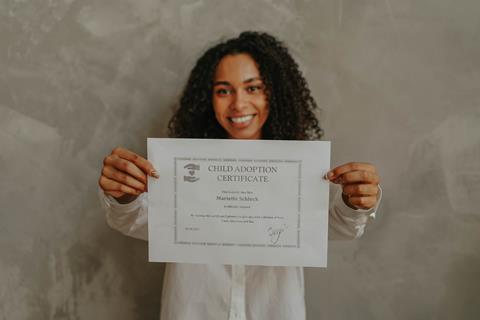Our contributor from fostering and adoption charity Home For Good shares her reflections on waiting to become a parent after being approved to adopt.

"…Well thank you very much Jules and Tom, and all the best for the future!" We hung up the Zoom call and looked at each other. Did we just get approved to adopt? On a Tuesday morning in our living room, with our laptop perched on a stack of books?
"That’s that, then," said my husband, looking shell-shocked. That’s that.
The adoption process up to the point of panel is a whirlwind of form-filling and incredibly in-depth chats with a social worker who now knows more about me than my own mother. It’s also full of frequent prayer requests to our group of supportive friends; requests that mainly ask for God’s hand over admin and bureaucracy and paperwork. But everything up to panel was hypothetical. A big "if". The moment the panel members approved us, that "if" became a "when".
And "when?" is a big question. "When?" is a question that has no answer. As Mother’s Day approaches, I’m keenly aware that I’m an expectant mother with no idea when my children will appear. And that is one of the strangest experiences of my life.
It helps to have tangible objects around the house that remind us that we are going to be parents.
There are things that help in this time of waiting and there are things that don’t. It helps to have tangible objects around the house that remind us that we are going to be parents. A small purple giraffe now takes up residence in our bed, following advice that giving our future child something that smells like us can help during introductions (the time we spend with our child before they move in with us). Though I’m not sure any child will enjoy a soft toy that smells like Tom… poor thing.
It helps to call our spare room "the kids’ room", and to think about where a cot or little bed will go when the time comes. It helps to look after our friends’ children to learn and observe different developmental stages (and they love all the free babysitting). It helps to acknowledge that Tom and I are not the only ones waiting; our parents are waiting be grandparents; brothers, sisters and friends are waiting to become aunties and uncles. Talking with them and sharing resources helps us remember that we don’t do this alone.
It helps to remember that it is God who has led us here. To hold on to fact that it is the example of Jesus – who shows us that family is more than who we’re married or directly related to – that set us on this journey. It helps to continue to pray for faith in the promise that God knows what he’s doing.
It helps to hold on to the example of Jesus – who shows us that family is more than who we’re married or directly related to.
It doesn’t help to try and guess when things are going to happen. It doesn’t help to check emails countless times an hour in the hope that our social worker has been in touch. It doesn’t help to be asked "any news yet?" by well-meaning acquaintances ("how are you feeling?" is a more helpful question).
But most of all it doesn’t help to think that we are the most important people in this process, because we’re not. The children who will come and be a part of our family – they are at the heart of all of it. We acknowledge that our family will be formed in the context of the separation and loss that they have already experienced in their young lives.
It’s helpful therefore to recognise that though we are embarking on something huge and significant, and though we’ll need heaps of support, this process isn’t actually all about us. It is right that we hold at the centre of this time the children – though we don’t yet know who they are – who are going to join our family. Children who may be experiencing a waiting of their own as decisions are made about their future. It’s right that we hold and acknowledge the birth parents and family members who will also experience the grief of saying goodbye to children who, for whatever reason, aren’t able to safely stay.
It doesn’t help to think that we are the most important people in this process, because we’re not.
We acknowledge that, for our future children, the experiences that led to them coming into care will have echoes into their future lives as they work out who they are. We acknowledge that if our children could healthily stay with their first family, we’d choose that for them over and over again. And we acknowledge that we come into the picture as a response to something that, really, just isn’t as it should be. So to put ourselves at the centre of this waiting narrative is to rather miss the point.
It is our privilege to be able to open our home to the children who, whenever the time comes, are going to be part of our family. But until that time, we wait in the knowledge that we are not the most important thing. And that is important in itself.
If you would like to find out more about fostering and adoption, visit www.homeforgood.org.uk or call Home for Good’s helpline on 0300 001 0995.
Names have been changed for anonymity.






























No comments yet